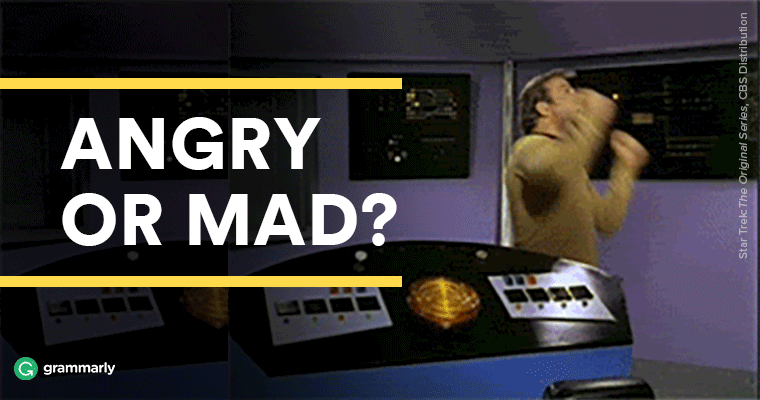
Getting mad about other people’s language mistakes is something that happens to the best of us. You don’t have to be upset about every “irregardless” you see or hear, but every once in a while, you might get the urge to correct the other person and explain to them why this word doesn’t make any sense. The same goes for all the “there, their, they’re” mistakes you find online. But even if you don your righteous grammarian cap in the same way you should drink alcohol (in moderation, and responsibly) you should always make sure that the mistake that’s causing your outrage is a real mistake. Here’s an example.
Angry is an adjective that’s used to describe something that relates to, is characterized by, or derives from anger. Anger is an emotion most of us feel from time to time, and like any other emotion, it can be healthy if it’s an appropriate response to something. Mad is an adjective used to describe something that relates to, is characterized by, or derives from serious mental illness. In some contexts it’s synonymous with crazy or insane. However, and herein lies the problem, people often use “mad” when they mean “angry,” and some find that practice upsetting. But they shouldn’t, for three very simple reasons.
The word “mad” was derived from the Old English word gemædde, which meant “out of one’s mind.” Pretty close to the meaning of “mad” we have today. “Mad” came into the language in the late thirteenth century, but by the early fourteenth century, it had already picked up the meaning of “being angry”—or “being beside oneself with anger,” to be precise. So there’s a long history of examples that attest to the use of “mad” in the sense of “angry.” Today, it’s much more common to hear it used this way in the United States than it is in the United Kingdom, even though the word “mad” isn’t used in the UK only when speaking about mental illness. But “mad=angry” is not an Americanism, and it’s nothing new. In fact, Shakespeare used it.
If you look up the words mad and angry in Google’s Ngram Viewer, do a Google News search for those words, or even search the Corpus of Contemporary American English for those words, you’ll come up with the same results: “angry” is much more common than “mad.” We still prefer to use “angry” when we mean “angry,” and if the published works covered by these three search tools are enough of a sample to go by, it doesn’t look like this is going to change.
And lastly, why should people get angry when words adopt new meanings at all? If there’s one consistent trait of language as a phenomenon of human society it would have to be its fluidity, the adaptability it has to have in order to keep up with the world. A while back, Merriam-Webster tweeted that it’s fine to use “mad” when we want to say “angry,” which prompted Slate‘s senior editor Gabriel Roth to call out the dictionary as acting like “the chill parent who lets your friends come over and get high.” But you don’t mess with Merriam-Webster on a word-driven social platform, because words are their business (you can read Buzzfeed’s coverage of the affair here). The point is that if dictionaries have adopted the practice of chronicling the use of language and not prescribing it to us, why would we get mad about “mad” being used instead “angry”? No reason, that’s why.






